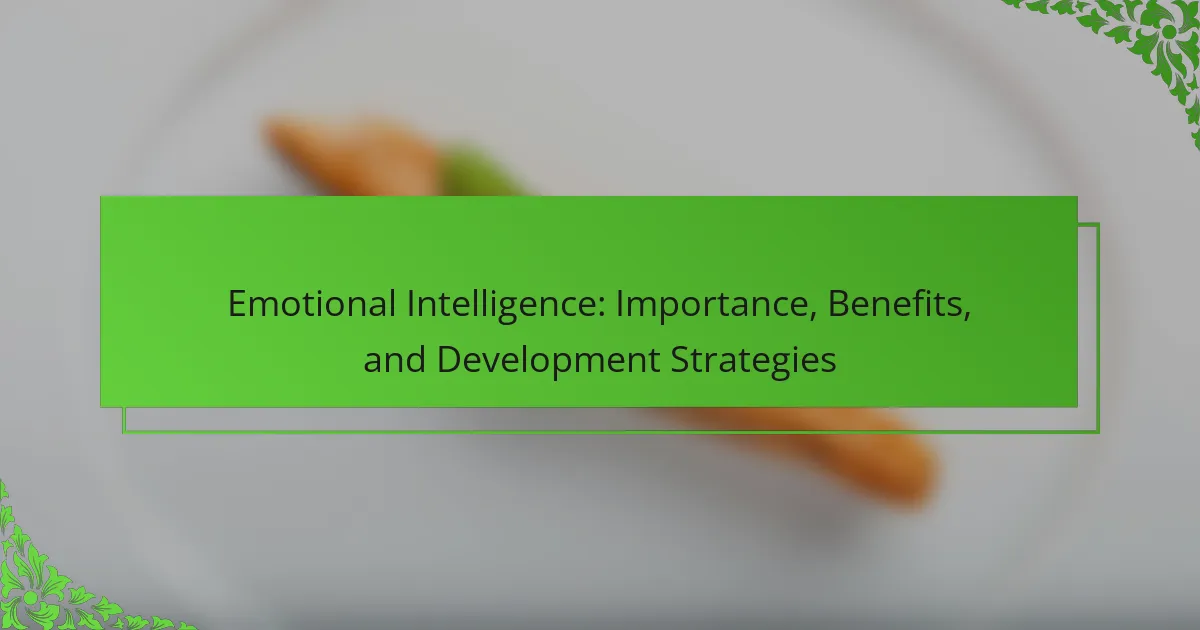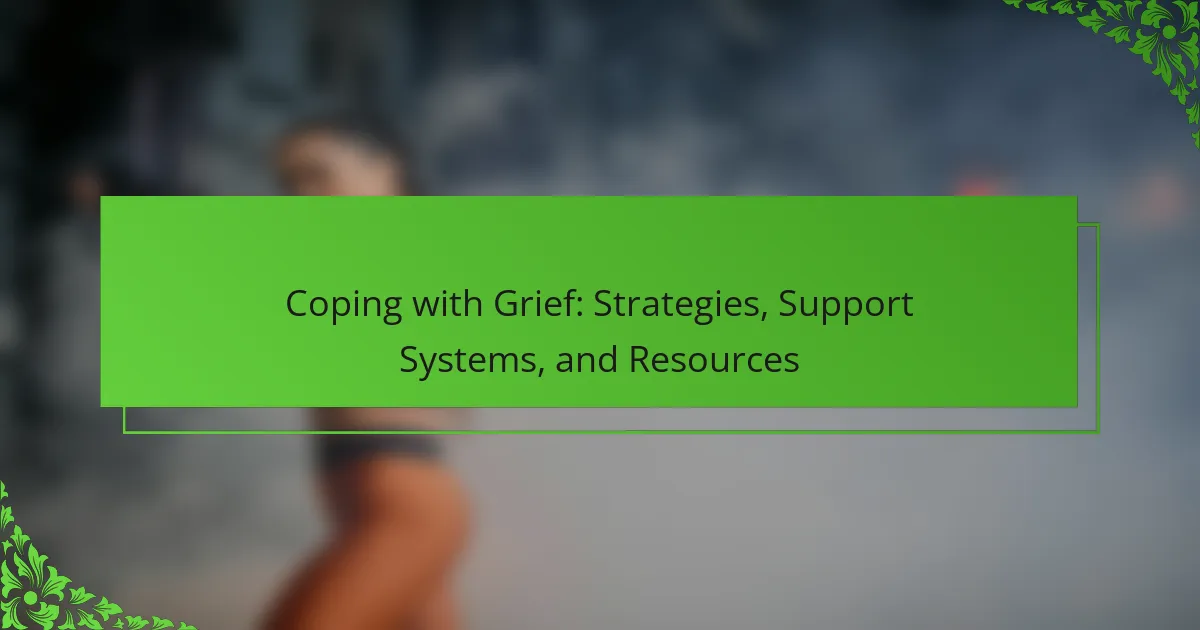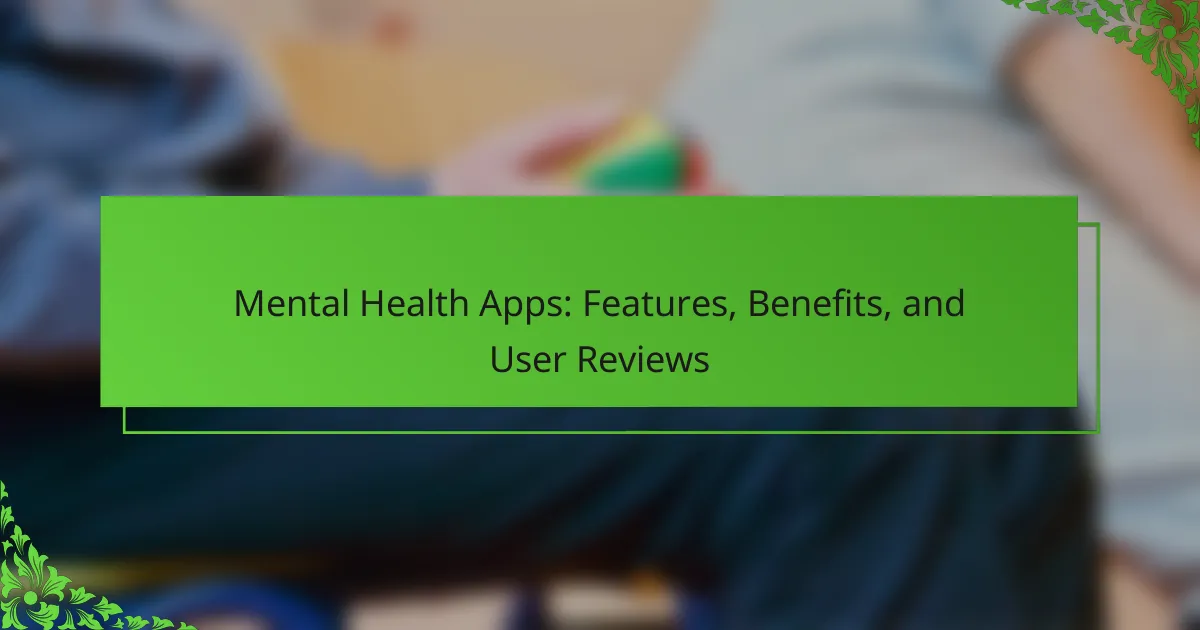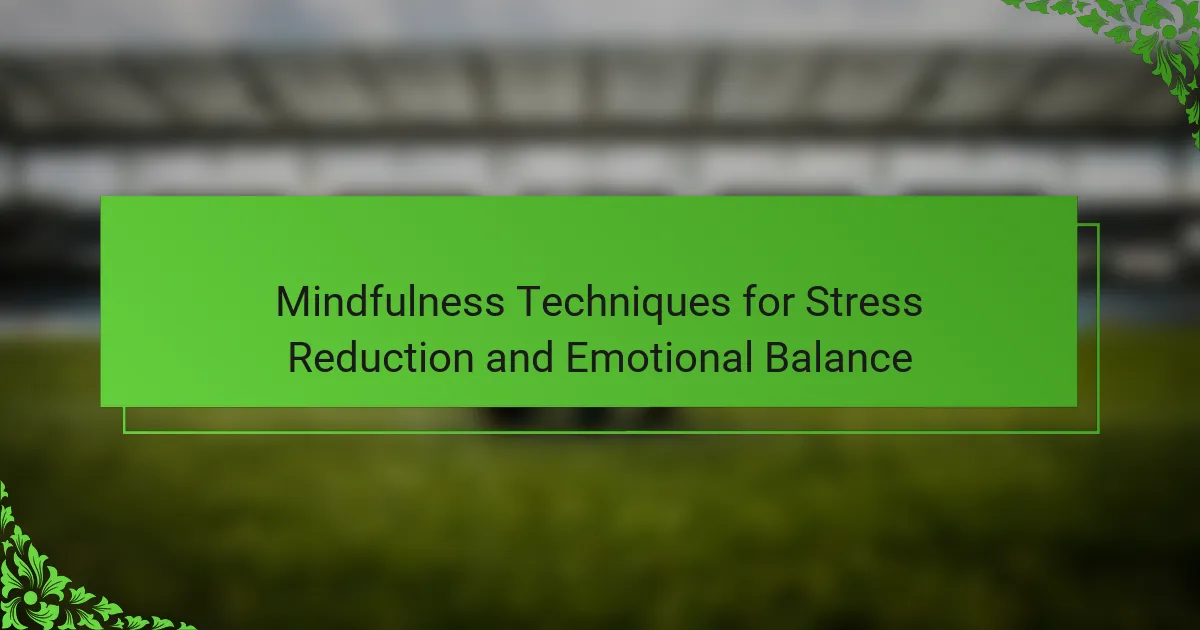Emotional intelligence is crucial for enhancing workplace communication and collaboration. It offers benefits such as improved decision-making, stress management, and interpersonal relationships. Development strategies include self-awareness practices, active listening, and emotional regulation techniques. Understanding cultural contexts and addressing misconceptions further enriches emotional intelligence, promoting personal and professional growth.
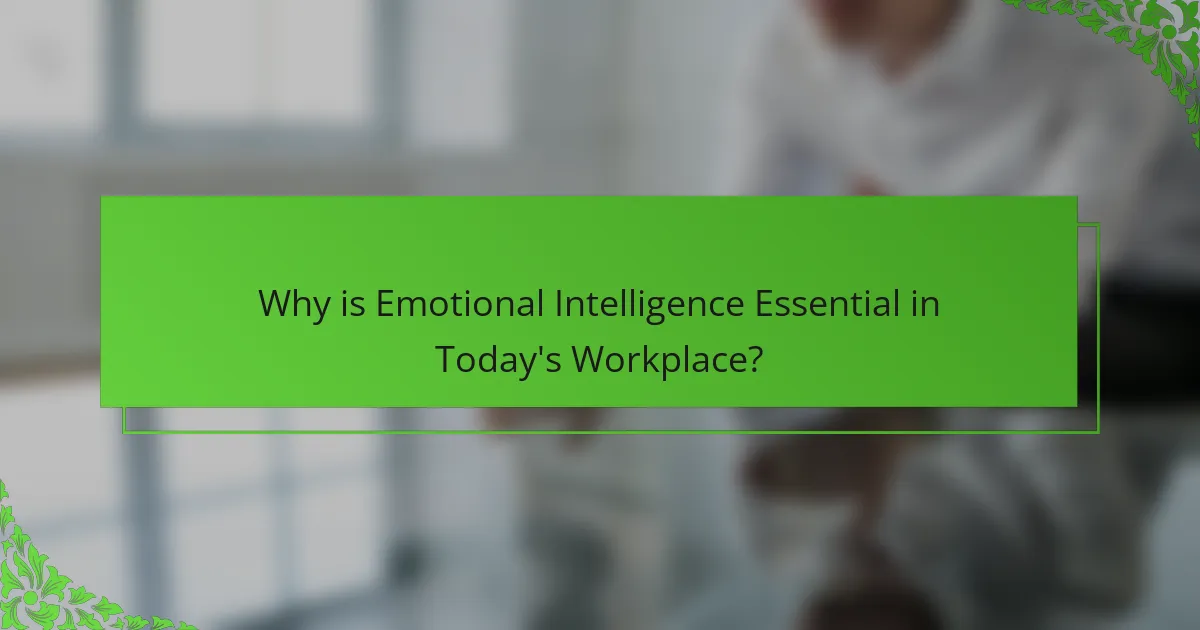
Why is Emotional Intelligence Essential in Today’s Workplace?
Emotional intelligence is essential in today’s workplace because it enhances communication, collaboration, and conflict resolution. High emotional intelligence leads to better team dynamics and improved leadership effectiveness. Research indicates that 90% of top performers possess high emotional intelligence, which drives engagement and productivity. Developing emotional intelligence through training and self-awareness practices can significantly benefit both individuals and organizations.
How Does Emotional Intelligence Impact Team Dynamics?
Emotional intelligence significantly enhances team dynamics by fostering collaboration and communication. High emotional intelligence leads to better conflict resolution and stronger relationships among team members. Teams with emotionally intelligent members experience increased trust and a more positive work environment, which boosts overall productivity. Additionally, emotional intelligence aids in understanding diverse perspectives, leading to more innovative solutions.
What Role Does Emotional Intelligence Play in Leadership?
Emotional intelligence is crucial in leadership as it enhances interpersonal relationships and decision-making. Leaders with high emotional intelligence can understand their own emotions and those of others, fostering a positive work environment. This skill leads to improved team collaboration and conflict resolution. Additionally, emotionally intelligent leaders inspire and motivate their teams, which boosts overall performance and job satisfaction. Developing emotional intelligence through training and self-reflection can significantly benefit leadership effectiveness.
Why Do Employers Value Emotional Intelligence in Hiring?
Employers value emotional intelligence in hiring because it enhances team collaboration and improves workplace culture. Candidates with high emotional intelligence can manage stress, communicate effectively, and empathize with others. These skills lead to better problem-solving and decision-making. Additionally, emotionally intelligent employees tend to show greater adaptability in dynamic environments. Overall, emotional intelligence contributes to higher employee retention and satisfaction rates.
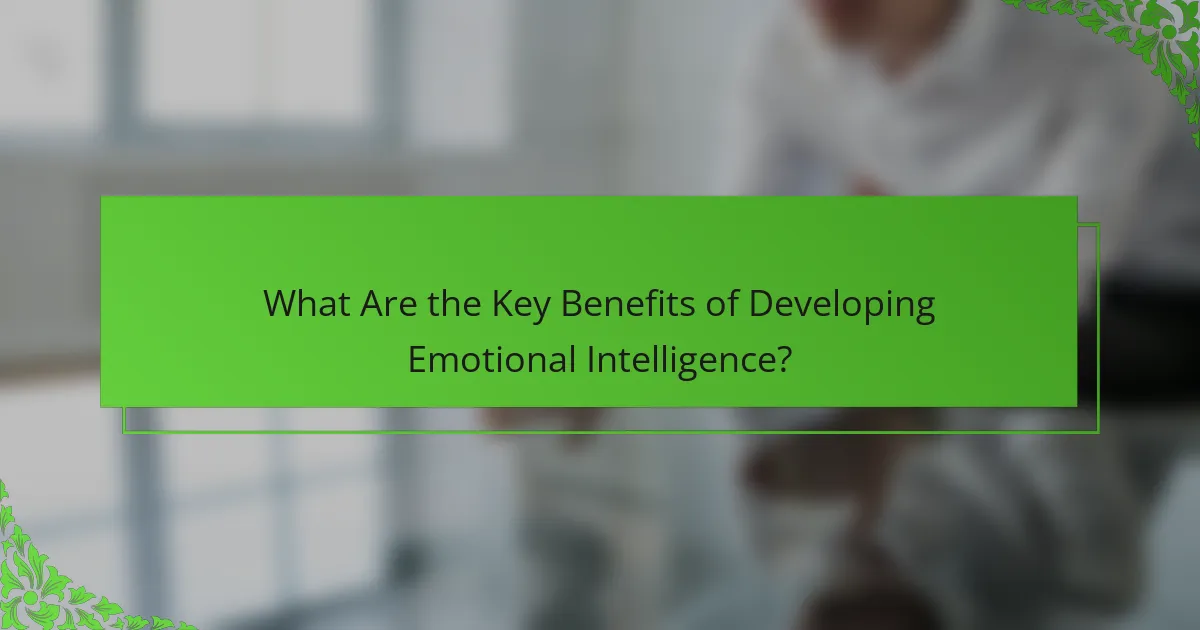
What Are the Key Benefits of Developing Emotional Intelligence?
Developing emotional intelligence enhances interpersonal relationships, decision-making, and stress management. Key benefits include improved communication skills, greater empathy, and increased resilience. These attributes foster better teamwork and leadership, ultimately leading to personal and professional growth. Emotional intelligence also contributes to mental health by reducing anxiety and depression, promoting overall well-being.
How Can Emotional Intelligence Enhance Personal Relationships?
Emotional intelligence significantly enhances personal relationships by fostering empathy, effective communication, and conflict resolution. Individuals with high emotional intelligence can better understand their own emotions and those of others, leading to stronger connections.
Research shows that emotionally intelligent people are more likely to maintain healthy relationships. They can navigate social complexities, respond to others’ feelings appropriately, and build trust. For example, they can recognize when a partner is upset and address the issue constructively, promoting harmony.
Developing emotional intelligence involves self-awareness, self-regulation, motivation, empathy, and social skills. Engaging in active listening, practicing mindfulness, and seeking feedback can enhance these abilities. As a result, individuals can cultivate deeper, more meaningful relationships.
What Influence Does Emotional Intelligence Have on Stress Management?
Emotional intelligence significantly enhances stress management by improving self-awareness and emotional regulation. Individuals with high emotional intelligence can identify stress triggers and respond effectively, leading to reduced anxiety and better coping strategies. This ability fosters resilience and promotes a healthier work-life balance. As a result, emotional intelligence serves as a crucial tool in managing stress effectively.
Which Long-Term Career Advantages Come from High Emotional Intelligence?
High emotional intelligence leads to significant long-term career advantages, including improved leadership skills, enhanced teamwork, and better conflict resolution. Professionals with high emotional intelligence can navigate workplace dynamics effectively, fostering collaboration and innovation. They often experience greater job satisfaction and lower stress levels, contributing to overall career longevity. Additionally, emotional intelligence supports adaptability in changing environments, making individuals more resilient to challenges.
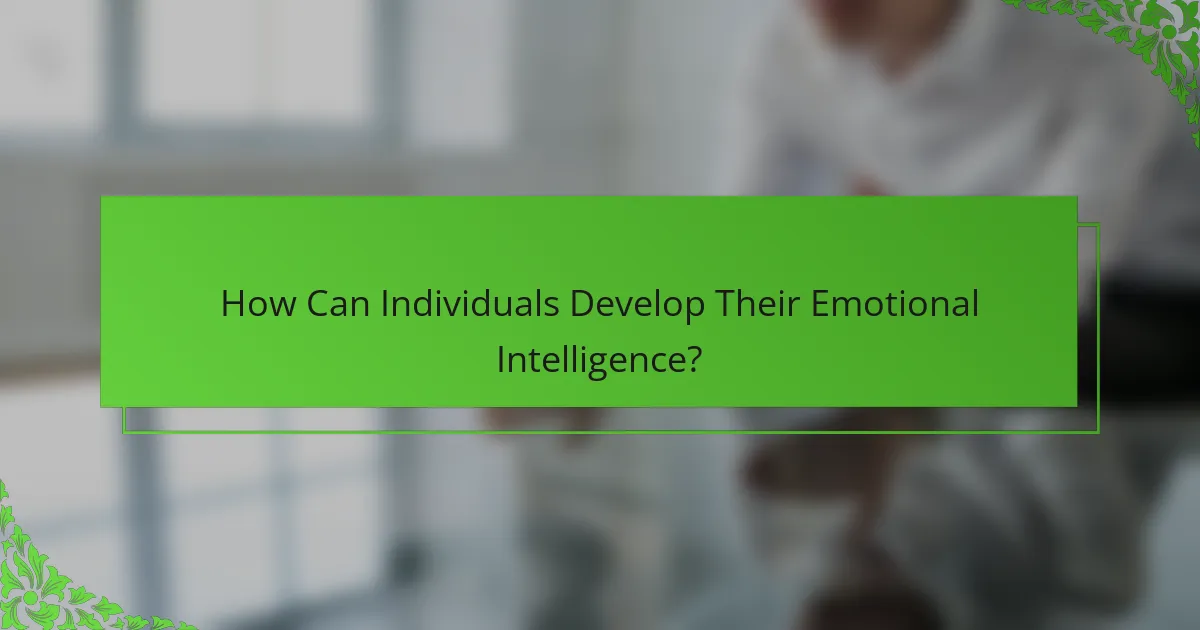
How Can Individuals Develop Their Emotional Intelligence?
Individuals can develop their emotional intelligence by practicing self-awareness, empathy, and effective communication. Engaging in mindfulness exercises enhances self-regulation, while seeking feedback fosters interpersonal skills. Additionally, setting personal goals for emotional growth can lead to improved relationships and decision-making. Regular reflection on emotional experiences further deepens understanding and resilience.
What Techniques Are Effective for Improving Self-Awareness?
Effective techniques for improving self-awareness include mindfulness practices, reflective journaling, and seeking feedback from others. Mindfulness enhances present-moment awareness, while journaling encourages deep personal reflection. Additionally, feedback from trusted individuals provides external perspectives, fostering growth. These strategies cultivate emotional intelligence and promote personal development.
How Can Active Listening Skills Be Enhanced?
Active listening skills can be enhanced through targeted practice and awareness. Focus on maintaining eye contact, nodding, and summarizing what others say. Engaging in role-playing exercises can also improve these skills. Additionally, seeking feedback from peers fosters growth in emotional intelligence, which is crucial for effective communication.
What Role Does Empathy Play in Emotional Intelligence Development?
Empathy is crucial for developing emotional intelligence as it enhances interpersonal relationships and self-awareness. It allows individuals to understand and share the feelings of others, fostering stronger connections. Empathy contributes to conflict resolution and effective communication, enabling better collaboration. Research shows that high empathy correlates with improved leadership skills and team dynamics. Thus, cultivating empathy is a key strategy in emotional intelligence development.
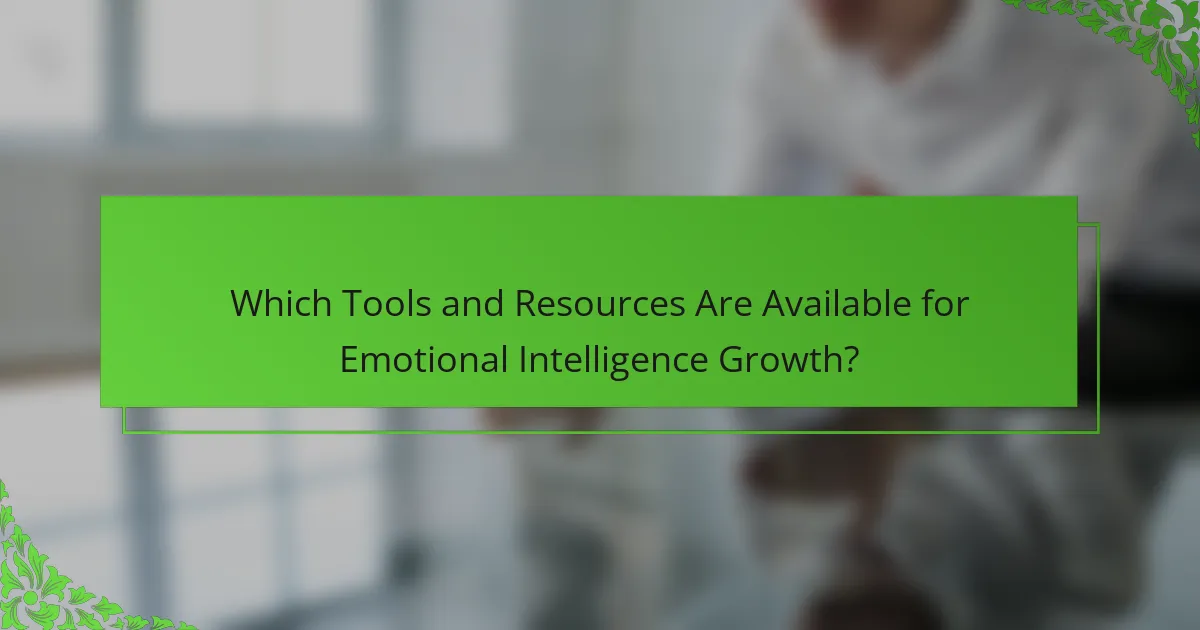
Which Tools and Resources Are Available for Emotional Intelligence Growth?
Various tools and resources are available to enhance emotional intelligence. These include online courses, workshops, books, and self-assessment tools.
1. Online courses: Platforms like Coursera and Udemy offer structured programs focused on emotional intelligence development.
2. Workshops: Local organizations and community centers often host interactive workshops that promote emotional awareness and regulation.
3. Books: Titles such as “Emotional Intelligence 2.0” provide insights and practical strategies for improving emotional skills.
4. Self-assessment tools: Tools like the Emotional Quotient Inventory (EQ-i) help individuals evaluate their emotional competencies and identify areas for growth.
5. Mobile apps: Applications like Moodfit and Headspace offer exercises and resources to practice emotional intelligence daily.
6. Coaching: Professional coaches can provide personalized guidance and support in developing emotional intelligence.
What Are the Benefits of Emotional Intelligence Training Programs?
Emotional intelligence training programs enhance self-awareness, improve interpersonal skills, and boost decision-making abilities. Participants often report better stress management and increased empathy. These benefits lead to stronger relationships and improved workplace performance. Research indicates that organizations implementing such programs see a 20% increase in employee satisfaction.
How Can Apps and Online Courses Facilitate Emotional Intelligence Learning?
Apps and online courses enhance emotional intelligence learning by providing accessible, structured content and interactive experiences. They offer personalized feedback, fostering self-awareness and empathy.
Mobile applications often include features like mood tracking and social interaction simulations, supporting real-time practice of emotional skills. Online courses typically deliver comprehensive modules, combining theoretical knowledge with practical exercises, which promote deeper understanding.
Furthermore, gamification elements in these platforms can increase engagement, making the learning process enjoyable. This approach can lead to improved emotional regulation and interpersonal relationships, key components of emotional intelligence.
In summary, technology facilitates emotional intelligence development through flexible learning options, immediate application, and engaging content.
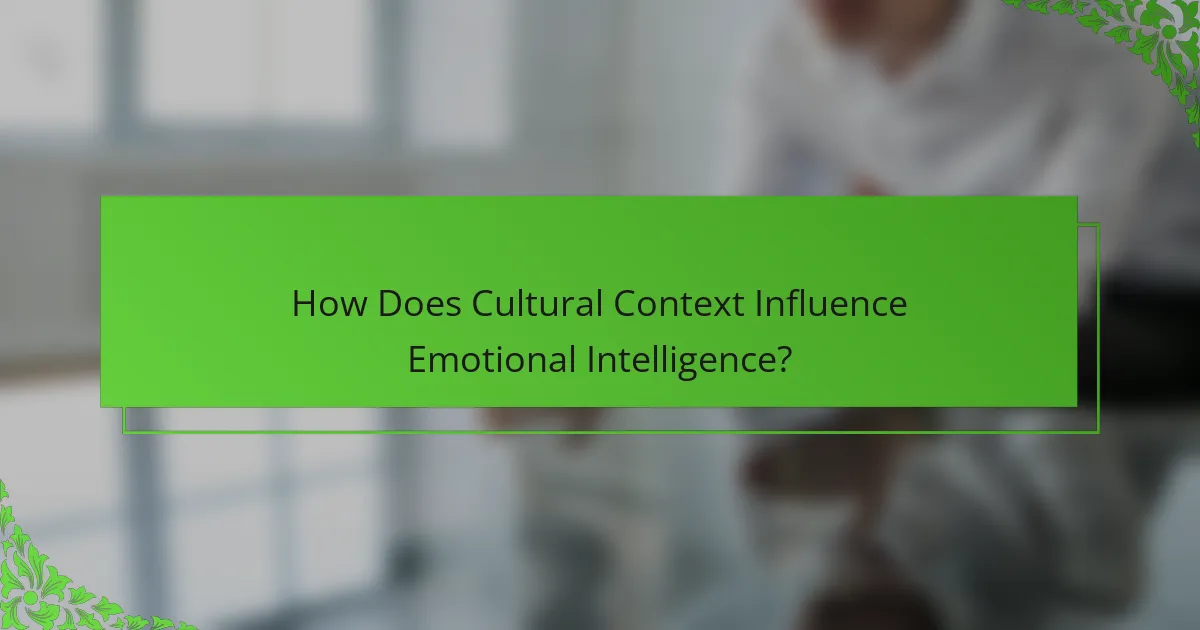
How Does Cultural Context Influence Emotional Intelligence?
Cultural context significantly shapes emotional intelligence by influencing how emotions are expressed and interpreted. Different cultures have unique norms regarding emotional expression, which affects interpersonal interactions. For instance, collectivist cultures may prioritize group harmony over individual emotional expression, impacting emotional awareness and regulation. Understanding these cultural nuances enhances emotional intelligence, fostering better communication and relationships across diverse environments. This awareness is essential for personal and professional development in a globalized world.
What Are the Differences in Emotional Intelligence Perception Across Regions?
Emotional intelligence perception varies significantly across regions due to cultural influences. In collectivist societies, emotional intelligence emphasizes group harmony and social cohesion, while individualistic cultures prioritize personal achievement and self-awareness. For example, studies indicate that East Asian cultures often value empathy and interpersonal relationships more than Western cultures, which may focus on assertiveness and self-regulation. These differences can affect workplace dynamics, leadership styles, and conflict resolution strategies across diverse regions. Understanding these regional variations enhances cross-cultural communication and collaboration.
How Do Cultural Norms Shape Emotional Intelligence Skills?
Cultural norms significantly influence the development of emotional intelligence skills. They shape how individuals recognize, express, and manage emotions in various social contexts.
In collectivist cultures, emotional expression may be more subdued to maintain group harmony, affecting interpersonal communication and empathy. Conversely, individualistic cultures often encourage open emotional expression, fostering self-awareness and assertiveness.
Research indicates that cultural background impacts emotional regulation strategies. For instance, cultures emphasizing emotional restraint may prioritize self-control, while others may value emotional authenticity.
Understanding these cultural influences can enhance emotional intelligence training by tailoring approaches to align with specific cultural contexts, ultimately improving interpersonal effectiveness and emotional resilience.
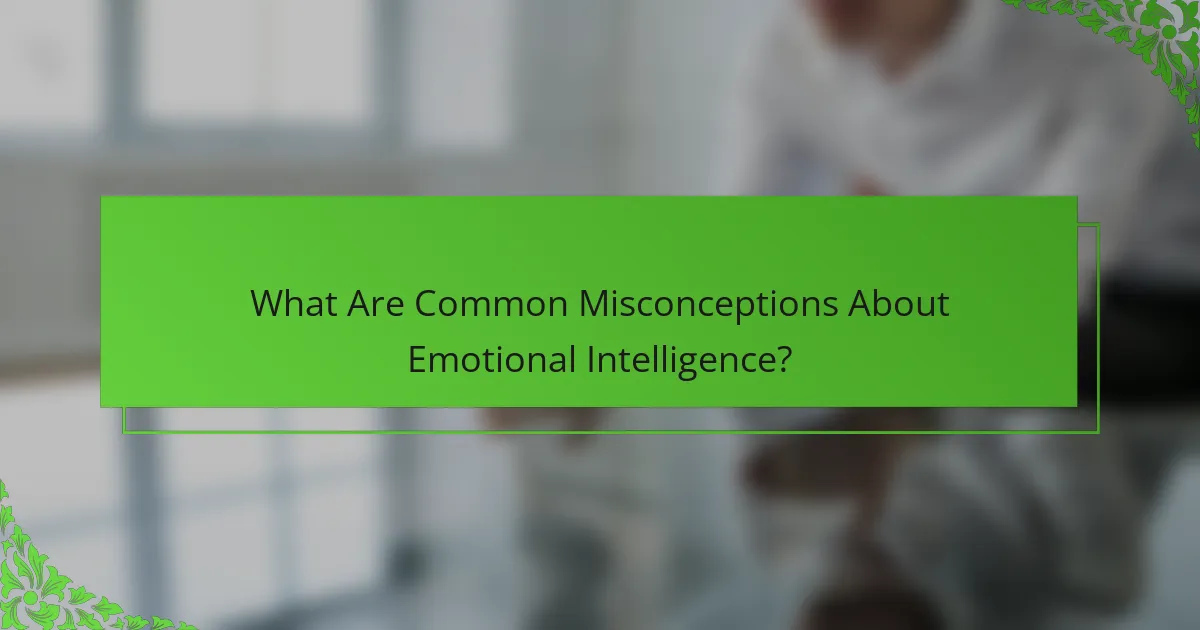
What Are Common Misconceptions About Emotional Intelligence?
Many believe emotional intelligence is solely about being empathetic, but it encompasses self-awareness, self-regulation, social skills, and motivation. These misconceptions can hinder personal and professional growth. For instance, some think emotional intelligence is innate, overlooking that it can be developed through practice and training. Others underestimate its impact on leadership and teamwork, as high emotional intelligence fosters collaboration and conflict resolution. Understanding these misconceptions is crucial for leveraging emotional intelligence effectively in various aspects of life.
Why Is Emotional Intelligence Not the Same as IQ?
Emotional intelligence differs from IQ as it focuses on understanding and managing emotions rather than cognitive abilities. Emotional intelligence encompasses skills like empathy, self-regulation, and social awareness, which are essential for effective communication and relationship-building. In contrast, IQ measures analytical and problem-solving skills. Developing emotional intelligence can enhance personal and professional relationships, leading to better teamwork and conflict resolution.
What Are the Limitations of Emotional Intelligence?
Emotional intelligence has limitations that can hinder personal and professional growth. One limitation is the potential for overemphasis on emotional aspects, leading to neglect of logical reasoning. Another issue is the variability in emotional intelligence across different contexts, which may result in inconsistent behavior. Additionally, individuals may struggle to accurately assess their emotional intelligence, creating blind spots in self-awareness. Lastly, cultural differences can impact the interpretation and expression of emotions, complicating interpersonal interactions.
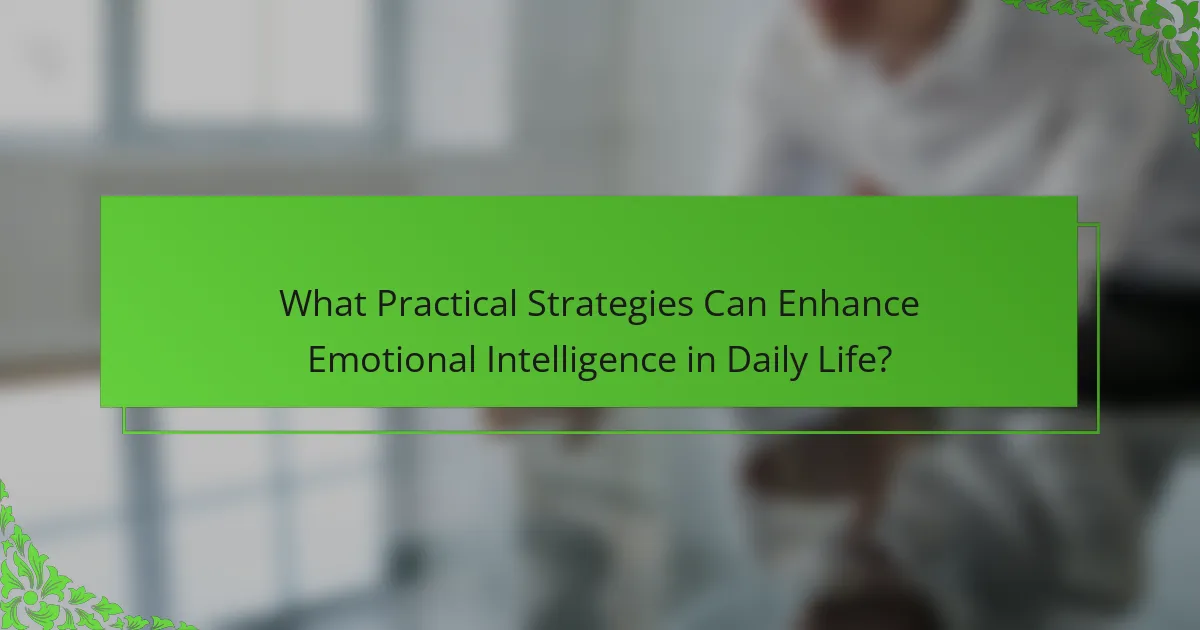
What Practical Strategies Can Enhance Emotional Intelligence in Daily Life?
Practical strategies to enhance emotional intelligence include self-reflection, active listening, empathy development, and emotional regulation. These methods foster better relationships and decision-making skills.
1. Self-reflection: Regularly assess your emotions and reactions to understand triggers and patterns.
2. Active listening: Focus fully on the speaker, acknowledging their feelings and perspectives without interruption.
3. Empathy development: Engage in exercises that encourage perspective-taking, enhancing your ability to relate to others.
4. Emotional regulation: Practice techniques such as mindfulness and breathing exercises to manage emotional responses effectively.
How Can Mindfulness Practices Improve Emotional Intelligence?
Mindfulness practices significantly enhance emotional intelligence by fostering self-awareness and empathy. These practices encourage individuals to observe their thoughts and feelings without judgment, leading to better emotional regulation. Research shows that mindfulness can improve interpersonal relationships, as individuals become more attuned to others’ emotions. Regular mindfulness practice may also reduce stress, which positively impacts emotional resilience. In summary, integrating mindfulness into daily routines promotes essential emotional intelligence skills, ultimately benefiting personal and professional interactions.
What Are the Best Practices for Applying Emotional Intelligence in Conflict Resolution?
Applying emotional intelligence in conflict resolution enhances understanding and collaboration. Key practices include active listening, empathy, self-regulation, and open communication.
1. Active Listening: Pay full attention to the speaker, acknowledging their feelings and perspectives. This fosters a safe environment for dialogue.
2. Empathy: Understand and validate the emotions of others, which helps de-escalate tensions and build rapport.
3. Self-Regulation: Manage your emotions to stay calm and focused during conflicts, preventing escalation.
4. Open Communication: Encourage honest expression of thoughts and feelings, promoting transparency and trust.
5. Problem-Solving: Collaborate on finding mutually beneficial solutions, reinforcing a sense of teamwork.
6. Follow-Up: Check in after resolution to ensure ongoing understanding and address any lingering issues.
Utilizing these practices cultivates a constructive approach to conflict resolution, leading to improved relationships and outcomes.
Which Common Mistakes Should Be Avoided in Emotional Intelligence Development?
To enhance emotional intelligence development, avoid common mistakes like neglecting self-awareness, underestimating the importance of empathy, failing to practice active listening, and not seeking feedback. These errors can hinder growth and reduce effectiveness in interpersonal relationships. Prioritizing self-reflection and continuous learning is crucial for successful emotional intelligence enhancement.
